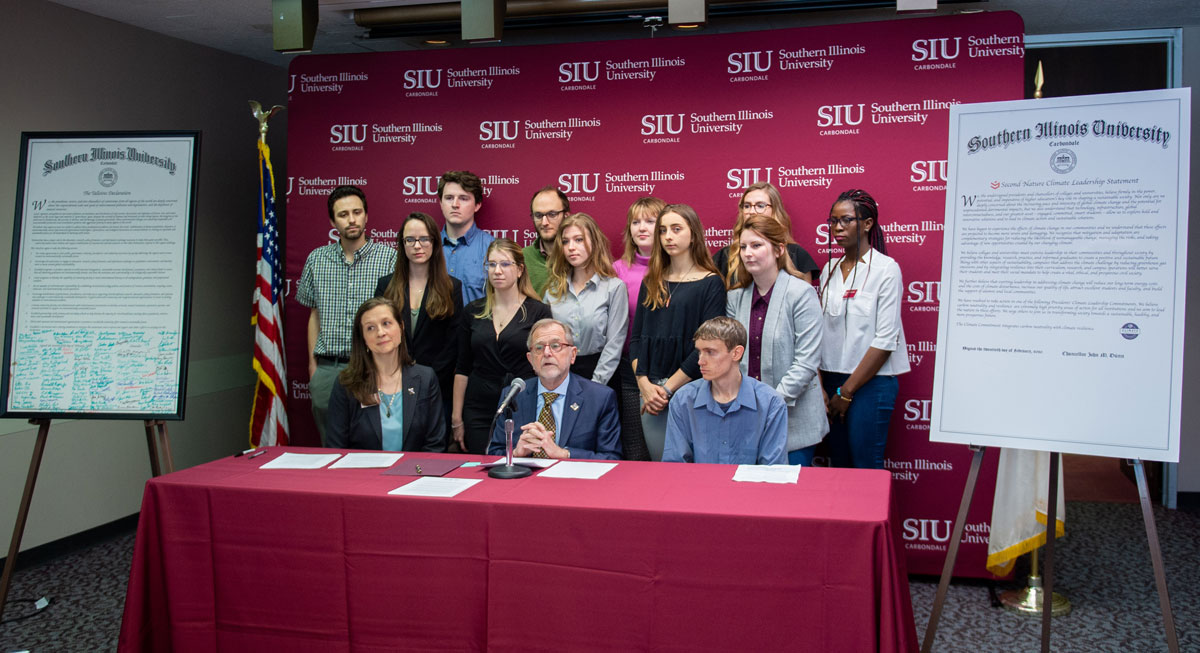
Committed to addressing climate change – SIU Carbondale Chancellor John M. Dunn signs the Second Nature Climate Commitment to address climate change through research and action on campus. Seated with Dunn are: from left, Geory Kurtzhals, SIU’s sustainability director, and right, Dylan Gibson, a graduate student studying geography and environmental resources.
February 20, 2020
SIU Carbondale makes climate commitment
CARBONDALE, Ill., — Southern Illinois University Carbondale reaffirmed the university’s longstanding commitment to sustainability when Chancellor John M. Dunn signed the Second Nature Climate Commitment on February 20, 2020.
More than 800 college and university leaders across the country have signed the commitment to address climate change through research and action on campus. Participating institutions commit to developing a campus plan that reduces greenhouse gasses, deploys alternative energy sources, creates energy efficiencies or includes other strategies that reduce their carbon footprints.
The signed commitment states that “colleges and universities must exercise leadership in their communities and throughout society by providing the knowledge, research, practice, and informed graduates to create a positive and sustainable future.”
Dunn said the Second Nature Climate Commitment extends SIU’s ongoing commitment to sustainability.
The university was the first in Illinois to sign the 1999 Talloires Declaration, an action plan for incorporating sustainability and environmental literacy at colleges and universities worldwide. SIU signed on to the Illinois Sustainable University Compact in 2007 and, two years later, implemented a student-driven green fee to support sustainability initiatives across campus.
Since then, SIU has been recognized as a Sierra Magazine Cool School and included in the Princeton Review’s Guide to Green Colleges. It has also earned designation as a bicycle-friendly campus and recognition from the Association for the Advancement of Sustainability in Higher Education.
“Our students have led the way, encouraging the university to be proactive on sustainability issues,” Dunn said. “I’m proud of their commitment and proud that the university is continuing to move forward. This signing is the first step in developing a Climate Action Plan that will help us to outline our own solutions to the climate change crisis.”
Dylan Gibson, one of the students who proposed the university’s participation in the Second Nature Climate Commitment, said students understand the impact of climate change.
"SIU students recognize the climate crisis as one of the defining challenges of our time,” said Gibson, a graduate student studying geography and environmental resources. “The Second Nature Climate Commitment is an opportunity for the university to begin to act in accordance with what is necessary to protect our community and society at large from its effects."
Geory Kurtzhals, SIU’s sustainability director, said the university’s reputation for sustainability will help attract students. She cited the 2019 “College Hopes and Worries” survey conducted by the Princeton Review, which indicated that 66% of prospective students who responded said a university’s commitment to “green” issues would influence their college choice.
“The concerns of our students mirror those of individuals and communities all around the world,” she said.
Second Nature is a non-profit organization dedicated to accelerating action on climate change through higher education. In 2006, Second Nature launched its signature program, the Climate Leadership Network, which was built on rigorous climate action commitments made by higher education’s presidents and chancellors.
The climate commitment requires the university to create an internal task force to guide the development of a plan within two months of signing. A joint university-community task force will be appointed and a campus greenhouse gas inventory will be completed within a year, and a “resilience assessment” evaluating university and community capacity for change will be completed within two years. The climate action plan must be completed within three years, and participating institutions complete annual, public reports on progress.
Tim Carter, president of Second Nature, congratulated the university on its commitment.
“In doing so, Southern Illinois University Carbondale will accelerate climate action and fulfill higher education’s role as a key agent of change for society,” Carter said. “Second Nature and the members of the Climate Leadership Network look forward to working alongside Southern Illinois University in its efforts to advance innovative and urgently needed climate solutions on their campus and in their community.”
